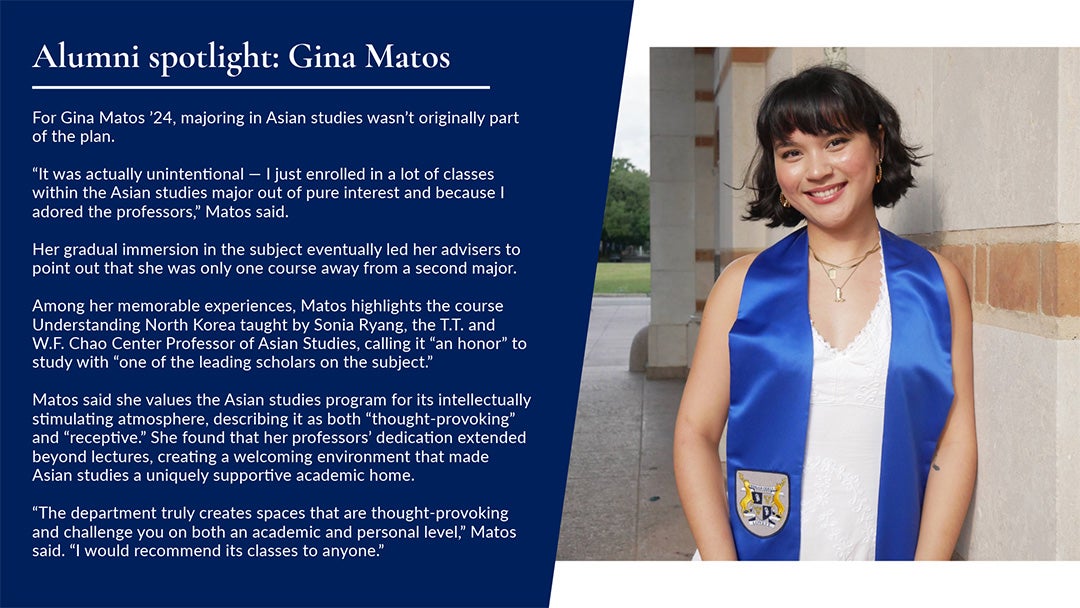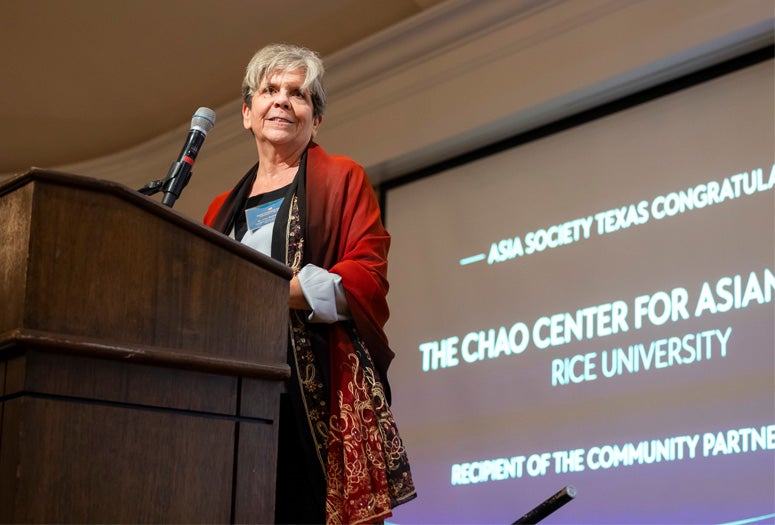
The Chao Center for Asian Studies at Rice University, recently awarded “Game Changer: Community Partner” by Asia Society Texas, stands out for its unique transnational approach, examining Asia’s complex histories, cultures and interactions beyond national borders. Under the leadership of Director Lisa Balabanlilar, who also serves as chair of the Department of Transnational Asian Studies, the center has become a hub for research and community engagement.
“The Chao Center for Asian Studies has always been capacious,” Balabanlilar said.
Anne Chao, program manager of the Houston Asian American Archive (HAAA) and adjunct lecturer in the humanities, explained that the center’s recent award “speaks to the good work that the faculty has been doing,” noting the broad academic scope of the center.
“Beyond HAAA, there are professors doing very in-depth research from Buddhism to art history to political pillars of history, cultural history and language,” Chao said. “We have well-qualified professors who are pushing the field of transnational Asian studies along, and that may be why, as a young center, it has staked its place.”
The Chao Center’s origins lie in the work of sinologist Richard Smith, the George and Nancy Rupp Professor Emeritus of Humanities, who established the Asian studies major at Rice with support from the Chao family.
“He had a large, radically open vision of what Asia is and could be, which is why Asian studies at Rice has always been unique,” Balabanlilar said.
According to Chao, this transnational perspective is foundational to the center’s impact, which extends beyond campus.

“Our faculty members are being asked to conduct lectures all over the country and all over the world,” Chao said, “so the department has a community impact on the academic front.”
The Chao Center also brings a range of cultural events to campus. Recent programs included a Noh theater mask demonstration, a Tibetan Buddhist mandala presentation and a performance by Kathakali dancers. These events highlight the center’s dedication to fostering global appreciation on campus.
The Chao Center’s impact expanded further with the creation of the transnational Asian studies department, which unified diverse scholars under one department. Prior to this, the center had Asian studies faculty spread across different departments, making it challenging to create a cohesive program.
“With the Chao Center being subsumed under the transnational Asian studies department, it has now become part of a larger program, which is what we always intended,” Chao said.
Balabanlilar credited Dean of Humanities Kathleen Canning and former Associate Dean Jeffrey Kripal, the J. Newton Rayzor Professor of Religion, with recognizing the need for a dedicated department.
“They came up with the idea to create a department out of the Chao Center and agreed on the name transnational Asian studies, a central concept I think is so important,” Balabanlilar said.
This new department immediately began to foster an innovative approach, bridging borders and promoting interdisciplinary research among faculty. With faculty across fields like history, art and philosophy, transnational Asian studies fosters intellectual creativity over academic boundaries.
“The beauty about this department is that it is highly interdisciplinary, which means that there’s a little bit of everything for people of all interests to enjoy,” said senior Sophia Govea, who is majoring in linguistics and Asian studies. “I wish more Rice students were aware of the breadth of courses which are available within the Asian studies department.”
Faculty members like Jaymin Kim and Eric Huntington, who specialize in Qing history and Asian philosophies, reflect the center’s commitment to exploring Asia’s cultural and philosophical complexities.
“Because our department contains a variety of humanists and social scientists, we don’t have to think about any kind of disciplinary purity test,” Balabanlilar said. “Nobody’s scholarship has to be in a box. We are the kind of department that could say, ‘We don’t care if you represent three disciplines in one person.’ Fundamentally we’re looking for intellectual creativity.”
For students like Lily Remington, a senior majoring in biosciences and Asian studies, the program has been transformative.

“I have learned how to more critically examine the issues faced by Asian and Asian diasporic populations as well as how to engage with Asian studies research in a productive and supportive manner,” Remington said. “By studying both Asian studies and biosciences, I have been inspired to pursue further education in global health after graduation.”
The department has attracted students like Remington from varied academic backgrounds, including STEM, social sciences and humanities. The Asian studies major now offers two tracks: transnational Asian studies and Asian language, encouraging fluency in an Asian language, a rarity among college programs.
“I like Asian studies because this helps me understand the Middle East and East Asia/China from an academic perspective,” said Yufei Qi, a senior studying bioengineering, physics, mathematics and Asian studies.
“I want to leverage this combination to pursue a career in foreign policy, focusing on U.S.-East Asian relations,” said junior David Lee, who is majoring in political science and Asian studies.
One of the Chao Center’s significant initiatives is HAAA. Designed as a “beyond-the-hedges project,” the archive preserves the experiences of Houston’s Asian American community and connects the university with the city. Chao shared that HAAA “has become a go-to source for people who want to know about the Asian American community in Houston” with more than 500 interviews available.
“For Rice student interns, HAAA has become a very interesting project,” Chao said, explaining that interns, many of whom are Asian American, gain insights into their own identities through interactions with older community members. “It reaffirms that their doubts and anxieties are all human.”
In addition to its impact on students, the HAAA’s influence has spread beyond campus. The archive has attracted inquiries from journalists and researchers nationwide, underscoring its status as a valuable resource on Houston’s Asian American history.
“We’re being very inclusive of all the Asian American communities in Houston,” Chao said. “That may be what distinguishes HAAA from other archives around the country.”
Looking forward, HAAA is bringing in an academic who created her own oral history archive to review and advise HAAA, ensuring its sustainability and growth. Meanwhile, the transnational Asian studies department is also focused on expansion with plans to hire a professor with expertise in South Asia who can bring fresh research and leadership.
Learn more about the Chao Center here.


